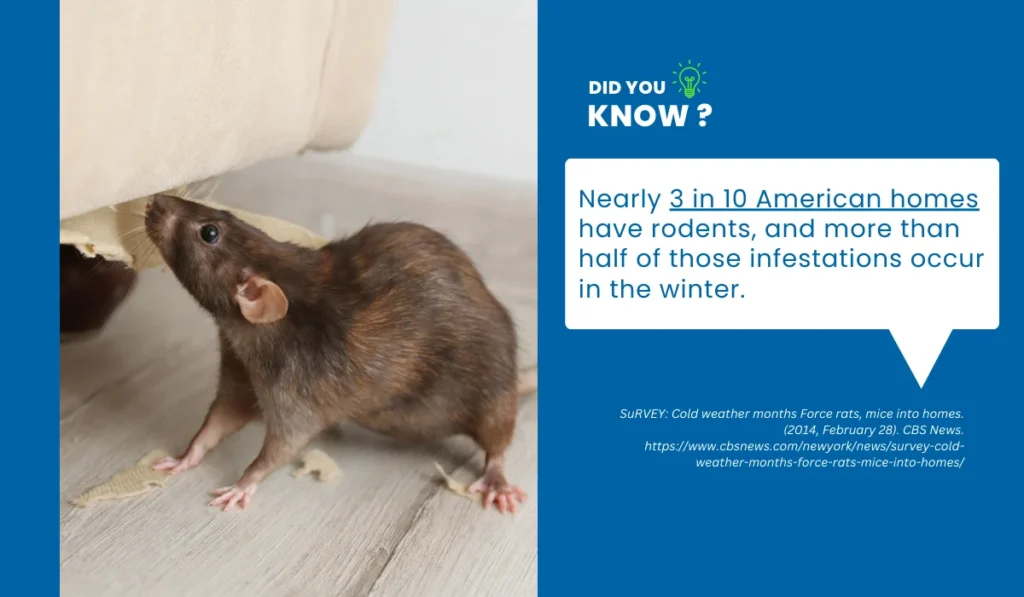10 Tips for Keeping Rodents Out of Your House During a California Winter
Nearly 3 in 10 American homes have rodents, and more than half of those infestations occur in the winter. Winter pests are often just seeking a warm place to take shelter, but can be brutal for homeowners to deal with around that time of year.

If you’ve noticed a rodent (or signs of them) in your home, it’s best to take action before the problem grows. Read on to learn how to keep rodents away from your nesting place this winter in California.
Key Takeaways
- Prevention methods like sealing entry points, maintaining a clean kitchen, and conducting regular inspections can help keep rodents away from your home.
- It might be necessary to take additional measures, such as DIY repellents, traps, and baits, if you notice signs of an infestation.
- When in doubt, call a professional to ensure the problem is completely eradicated and won’t come back.
– – –
🐜 Get rodent control in Sacramento County or San Diego County
Rodent infestations will not go away on their own
Contact Us Now To Get Rid Of Them
– – –
1. Seal Entry Points
A mouse can fit through a hole the width of a pencil, so be sure to patch up any small gaps, holes, and crevices you can find in your home (and any buildings or garages).
Whether it’s openings near pipes, in kitchen cabinets, near outlets, behind appliances, in corners of closets, or even in the rafters, it’s best to seal them.
Use caulk and steel wool for smaller holes; hardware cloth, cement, metal sheeting/wire mesh, lath metal, or lath screen will suffice for larger holes. If you use steel wool, use caulk or spray foam to keep it in place.
2. Trim Vegetation
You might not think of vegetation in your yard as a threat when it comes to your home’s rodent problem, but branches and bushes can actually act as “bridges” for rodents to enter your home.
Be sure to trim plants to keep them at least 18 inches away from your house. Maintaining your trees and plants can also expose outdoor rodent nests that might’ve otherwise gone undetected.
In addition to trimming branches that touch or might grow to touch your home’s walls, windows/window screens, and exterior doors, don’t forget your roof—an oft-forgotten easy access point for rodents.
3. Secure Trash and Food
Eliminating food sources is one of the quickest ways to keep pests out of your home. Seal any snacks or leftovers in airtight containers and maintain a clean kitchen and pantry.
Clean any crumbs or spills immediately, and clean up pet food after your pet has finished eating.
Dispose of spoiled food as soon as possible, and clean out your fridge regularly. Don’t let trash become a problem—take out the garbage as soon as you notice the bag becoming full.
Rodents will eat almost anything, but prefer foods that are highest in fat, protein, and sugar, such as bacon, chocolate, butter, and nuts.
4. Clean Regularly
Keeping a clean home will discourage a rodent infestation. In addition to sealing food and disposing of trash regularly, it’s important to keep up with a regular home cleaning schedule.
Vacuum, sweep, mop or Swiffer, and wipe down countertops and other surfaces regularly, especially in the kitchen and bathroom. Do the dishes immediately.
Avoid leaving piles of clothes out, as clothing can often be a nesting material of choice for rodents. Moreover, the scent of common cleaning products can often act as a natural deterrent for pests.
5. Proper Storage
Even the way you store your food and belongings can make your home more susceptible to a rodent problem. Store items in your closets, attic, and basement in plastic bins rather than cardboard boxes, which can be attractive to mice.
Use a tightly sealed trash can, and store food in tupperware rather than plastic bags (which can be chewed open).
If you suspect an infestation, consider using plastic furniture wraps and mattress wraps to prevent damage.
Keep storage containers high off the ground whenever possible. If you have an external storage unit, visit regularly to inspect and take these same preventative measures (i.e. cleaning, sealing entry points).
– – –
🐜 Get rodent control in Sacramento County or San Diego County
Rodent infestations will not go away on their own
Contact Us Now To Get Rid Of Them
– – –
6. Inspect Attics and Basements
It’s crucial to regularly inspect your attic, basement, or crawl space for signs of mice, rats, and other rodents throughout the winter (and year-round). Look for common indicators like:
- Droppings (the size of grains of rice; urine can be seen under a blacklight in a dark room)
- Tracks (footprints in dust, spilled flour, or other powdery substances), teeth marks and chewing (on food packaging, along the edges of baseboards, and on furniture and belongings)
- Scampering or scratching sounds
- Nests or stash piles (shredded materials like wool, fabric, cardboard, furniture stuffing, paper, building insulation, or plants formed into a 4-6 inch diameter ball)
- Scattered nesting materials
- Dark smudge marks from mice traveling along walls
- A musky, ammonia smell
7. Keep Your Yard Clutter-Free
Keeping your yard clean and your landscaping neat will prevent rodents from nesting near your home and finding potential entry points. Clear out wood piles and leaf piles where possible, and be sure to prune plants regularly.
Don’t allow outdoor trash cans to overflow, and cover any burrow holes you might see with dirt or rocks. You can even use plants known to repel mice, such as lavender and mint.
8. Use Traps
Sometimes, the best solution to put an end to your rodent problem is good old-fashioned mouse traps. Set up bait stations throughout your house, or use humane catch and release traps.
You can purchase traps and baits online or at any hardware store, or create a DIY version by placing peanut butter on a slippery soda can and balancing it over a bucket (with a wood “ramp”/path for access to the soda can, which can be skewered on a stick).
9. Natural Deterrents
Natural repellents can also help keep rodents away from your home. Examples include:
- Diffused essential oils like peppermint oil or lavender oil (you can also place oil-soaked cotton balls in problem areas)
- Cheesecloth sachets of cloves
- Bottled ammonia or kitty litter (which give off the scent of a nearby predator)
- Mothballs
- Sprinkled cinnamon or burned cinnamon incense
- Vinegar (spray vinegar diluted with water around your home with a spray bottle)
- An ultrasonic pest repeller, an electronic device that emits a “beeping sound” that’s unpleasant to rodents (available online or at hardware stores).
– – –
🐜 Get rodent control in Sacramento County or San Diego County
Rodent infestations will not go away on their own
Contact Us Now To Get Rid Of Them
– – –
10. Call a Professional to Help
When you suspect a rodent infestation in your home, it’s best to call a professional pest control company sooner rather than later. A professional can find the root of the problem, and recommend the best control and prevention methods to ensure it doesn’t come back.
If you’ve noticed one pest, it means there are likely more nearby, and it’s better to act fast than to be faced with a bigger infestation later on.



